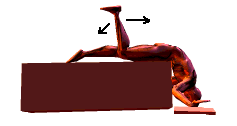Hamstring Injuries
By Mark Jenkins, MD
Editor’s Note: Because hamstring injuries are so common in karate, kung fu and other martial arts we have posted this article from the SportsMedWeb.
The hamstring muscles are located in the back of the thigh and injuries can be acute or chronic. Sprinting subjects these muscles to high tension loads and sudden tears can occur. The recent Olympic games in Atlanta saw several sprinters go down in agony with acute hamstring injuries. Conditions that predispose to acute injury are,
• inadequate warm-up/stretching,
• poor lower back flexibility, and
• abnormal biomechanics (e.g., anterior pelvic tilt).
Chronic hamstring injuries usually arise from an improperly rehabilitated acute injury, but may occur as the result of small amounts of trauma repeated over a long period (i.e., distance running). Poor hamstring flexibility increases the likelihood of small tears, which in turn cause the muscle to shorten and get tighter. A vicious circle can become established. Prompt and appropriate initial treatment can break this spiral. The initial care of an acute hamstring injury involves the R.I.C.E. regimen. This acronym stands for,
• rest,
• ice,
• compression (e.g., an ace bandage), and
• elevation.

The final phases of treatment, as well as prevention, involve correcting any existing biomechanical problems and a hamstring strengthening program. A good running coach can help uncover any abnormal motion in running and video analysis can help show the athlete what is happening. Weak abdominal muscles are often the cause of an anterior (forward) pelvic tilt. Finally, eccentric exercises are vital for the prevention of hamstring injuries.

This article is posted with permission of Dr. Mark Jenkins and SportsMedWeb.
NOTE: THE MEDICAL INFORMATION PROVIDED IN THIS ARTICLE IS OF A GENERAL NATURE AND CANNOT BE SUBSTITUTED FOR CARE PROVIDED BY A QUALIFIED HEALTH PROFESSIONAL. THE CONTAINED INFORMATION DOES NOT ESTABLISH A DOCTOR-PATIENT RELATIONSHIP, AND FIGHTINGARTS.COM, THE AUTHOR OR RICE UNIVERSITY CANNOT TAKE RESPONSIBILITY FOR ITS USE, OR MISUSE. EVERY EFFORT HAS BEEN UNDERTAKEN TO MAINTAIN THE ACCURACY THE INFORMATION CONTAINED WITHIN. HOWEVER, YOU MUST INDEPENDENTLY VERIFY WHETHER THE MEDICAL INFORMATION IS APPROPRIATE TO YOU BY CHECKING WITH YOUR DOCTOR.
Mark Jenkins, MD
Dr. Jenkins is Director of SportsMedWeb. He is a Board Certified medical practitioner, Director of the Student Health Service at Rice University and Associate Team physician for Rice University (N.C.A.A. sports).
Search for more articles by this author:







